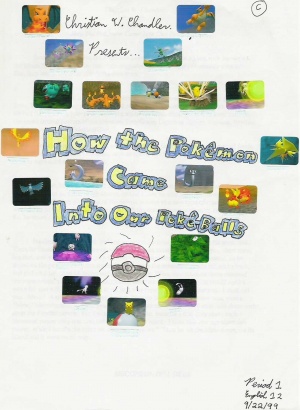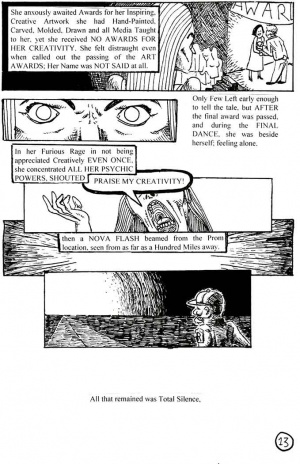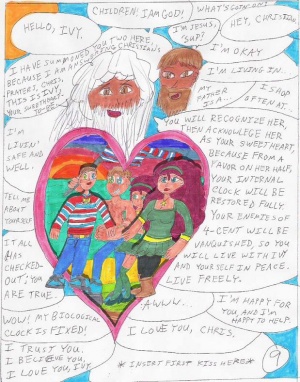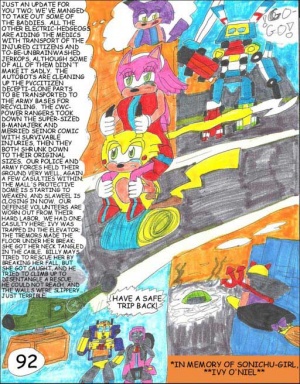Difference between revisions of "Chris and writing"
(→Sauces: rm empty section) |
(→Chris and short fiction: Literary analysis in three, two, one...) |
||
| Line 26: | Line 26: | ||
This story in particular displays Chris's inability to immerse himself in a character that is not simply some strangely conceived [[Christian Weston Chandler|version of himself]]. | This story in particular displays Chris's inability to immerse himself in a character that is not simply some strangely conceived [[Christian Weston Chandler|version of himself]]. | ||
=== Exposition === | |||
The High School Story is extremely exposition-heavy - or, rather, it's a piece that does nothing ''but'' exposition. In this story, Chris is telling a tale like he would be telling about something that happened in real life (which, incidentally, is not very far from the truth) - the whole story could be used as an illustration of the "[[wikipedia:Show, don't tell|show, don't tell]]" rule. | |||
When confronted with sentences like ''"Now, Terrah was a Great Artist, as she was well-known and well-praised in the number of Art Classes she took at Menchi-Nasu High"'', your average reader will probably ask "yes, but what was that artwork ''really'' like? How exactly was she praised, and who praised her? This story doesn't tell that!" As is [[Mailbag|often demonstrated]], Chris doesn't like to elaborate on things, and assumes everyone gets the whole picture from a single statement of fact. | |||
We don't hear of examples of Terrah's masterful brushwork or competent scene composition in her paintings, or hear of her painstaking attention to detail as she worked the clay, sweat on her brow, barely aware of the passage of time, in the eerie, slightly flickering glow of the fluorescent lights in the art classroom in the basement of the aging public school - a grossly underfunded institution that was barely equipped to let her reach her full potential. We don't hear of the supressed tears of her classmates as they gaze upon the artwork that is utterly and totally full of Win. We don't hear of her teacher discussing the latest works of the little prodigy with other teachers over coffee. ''Because that would be showing.'' | |||
This isn't to say that using only exposition would be always bad. "How the Pokémon Came into Our PokéBalls" is an example to the contrary, because many myths are told in highly expository manner, as a recounting of events that happened long ago. For example, when people read about God creating the light in Genesis 1:3-4, they usually don't ask what "it was good" ''really'' means; no one, aside of a few enthusiastic theologians, immediately asks what was God's ''motivation'' in creating light, or how He might have ''really felt'' that day. Readers can't expect answers to those questions, because the events happened long before they were written. (TL;DR: Myths are myths and fiction is fiction, okay?) | |||
== Chris as a comic writer == | == Chris as a comic writer == | ||
Revision as of 18:10, 3 December 2009
While Chris has not shown his mastery at composing titillating pieces of literature as often as he has astounded us with his artistic skill, he has nevertheless shown what he has been capable of through his outlandish webcomic, several ill-guided blogging attempts and multiple short pieces of fiction and poetry.
Chris as a poet and lyricist
- See also: Chris and music
| “ | I’d lay her down caress her gently tickle her fancy; have her tickle my fancy, and give it to her with the learned lonely experience I’ve endured. | ” |
| Chris, expertly stirring feelings of both mild disgust and confusion | ||
Chris' lyrics vary from acceptable for the sort of cheesy tie-in music used with certain franchises he is a fan of usually written by D-list hack writers, to hilariously awful, full of painful rhymes giving us lines such as "if no girl comes, I'll break my arm."
His poetry, however, is far worse: it's abysmal, consisting in one assault after another on the English language. Painful rhymes are even more present than in his songs; other times, he breaks the mood of the poem to throw in some of his trademark random-access humor. Chris also tends to use rather dated language in his poetry, not unlike in his written messages to his fanbase; however, it is not "how do I love thee" dated which is generally acceptable, but the sort of mushy language used in Valentine's Day cards like the ones kids hand out in elementary school, or perhaps the dialogue on many old television shows. This is especially evident in his poems "Valentine's Day Hymn" (which is not a hymn, or any sort of song at all, as it lacks both a discernible tune and any sort of rhyme or meter scheme) and "Saddest Heart in the World."
Chris and short fiction
Chris shows the same amount of skill when concocting small pieces literature as he does when crafting poetry. Earlier works, like How the Pokémon Came into Our PokéBalls and Sonichu & Rosechu… The Genesis of the Lovehogs show a slightly juvenile, simple writing style. Like many elementary school kids, Chris frequently pauses the action to describe exactly what a character is wearing and expound upon trivial aspects of characters in unnecessary detail. This is counterbalanced by frequent glossing over things that may have relevance at some point. But overall, these pieces have certainly childlike charm, and would be moderately impressive if done by a 4th grader.
Until you realize Chris was fucking eighteen years old.
| “ | Needing to hit the monster in the same manner, Super Sonic rushed again at such a speed. And once again, he ran in and came out the mouth. | ” |
| Chris, proving the devil is in the details. | ||
Recently an impressive new work has emerged along with the CWCipedia. Dealing with yet another female adaptation of Chris, The High School Story is another fascinating and vaguely creepy look at Chris's literary process. While the narrative and sense of drama has been amped up considerably, confusing grammatical and syntax problems are far more present. Whereas most pieces of fiction utilize the rules of the English language to better express their story, Chris made the bold move to screw the rules entirely.
| “ | She felt angry when she heard "Lesbian"; when called that, she would leave the bully an intimidating glare with a purple glow from her green eyes. Then soon after, a Strong, Straight Homophobe would attack that bully with No Mercy; beat the crap out of that person. | ” |
| Chris, momentarily forgetting the story in order to encourage gay bashing | ||
This story in particular displays Chris's inability to immerse himself in a character that is not simply some strangely conceived version of himself.
Exposition
The High School Story is extremely exposition-heavy - or, rather, it's a piece that does nothing but exposition. In this story, Chris is telling a tale like he would be telling about something that happened in real life (which, incidentally, is not very far from the truth) - the whole story could be used as an illustration of the "show, don't tell" rule.
When confronted with sentences like "Now, Terrah was a Great Artist, as she was well-known and well-praised in the number of Art Classes she took at Menchi-Nasu High", your average reader will probably ask "yes, but what was that artwork really like? How exactly was she praised, and who praised her? This story doesn't tell that!" As is often demonstrated, Chris doesn't like to elaborate on things, and assumes everyone gets the whole picture from a single statement of fact.
We don't hear of examples of Terrah's masterful brushwork or competent scene composition in her paintings, or hear of her painstaking attention to detail as she worked the clay, sweat on her brow, barely aware of the passage of time, in the eerie, slightly flickering glow of the fluorescent lights in the art classroom in the basement of the aging public school - a grossly underfunded institution that was barely equipped to let her reach her full potential. We don't hear of the supressed tears of her classmates as they gaze upon the artwork that is utterly and totally full of Win. We don't hear of her teacher discussing the latest works of the little prodigy with other teachers over coffee. Because that would be showing.
This isn't to say that using only exposition would be always bad. "How the Pokémon Came into Our PokéBalls" is an example to the contrary, because many myths are told in highly expository manner, as a recounting of events that happened long ago. For example, when people read about God creating the light in Genesis 1:3-4, they usually don't ask what "it was good" really means; no one, aside of a few enthusiastic theologians, immediately asks what was God's motivation in creating light, or how He might have really felt that day. Readers can't expect answers to those questions, because the events happened long before they were written. (TL;DR: Myths are myths and fiction is fiction, okay?)
Chris as a comic writer
- See also: Chris and art, Sonichu comic
Lack of cohesive script
Like all forms of narrative art, a comic needs a script. No one who writes serious comics keeps the scripts in their heads; most comics are scripted either in very rough sketch form, or textually, or both. When discussing the video game plans, he said his game ideas are in his head, and he'd probably say the same about the comic. If Chris has a grand plan for the comic, he's using the same "pure gold on first try" mentality as in everywhere else.
Textwalls and unreadable bubble layouts
As far as dialogue writing goes, aside from no proofreading and editing, Chris's biggest sin is textwalling. Characters just can't shut up at times, and this leads to Chris forgetting that comics are meant to show the readers things, and not turn into inconveniently typeset novels without any of the requisite bits of narration and scene-setting. He has absolutely no organization to his speech bubbles, sometimes forcing readers' eyes to jump all over a page to try and put together what he was trying to say, including using numbers to disclaim the flow of a conversation. This is despite the wide availability of speech bubble creation software on the Internet, where neat and organized text is placed within a bubble after the fact, allowing even the most amateur of artists to script on the side and focus much more on the art by setting aside the bubble space, but worrying about the layout of text later in the creative process.
When Chris draws his comic pages, he draws them while attempting to squish EVERYTHING onto the page. He leaves nothing to the imagination as he will try to show everything that has happened on one page. One of the earliest examples of this can be seen with Sonichu 0 with the Pikachu running into action at the same time Sonic turns into Super Sonic and attacks Perfect Chaos. Where most comics tend to have six panels of action at most, Chris slams in a whopping 10 panels onto the page. The end result of trying to cram as much action as he can is an amazing mess, unable to tell what is going on on a certain page. The manhandling of the material is a symptom that, once again, speaks of lack of planning, preparation and refining-based approach.
Kudzu plot
Newer issues, written under increasing troll pressure, also introduce one big problem: Chris likes to put in tributes to "fans", and those plotlines never go anywhere. Leaving loose strands was a problem with Chris's work earlier (Just what the hell happened to the Metal Sonichu, anyway?) but it has really amplified in the recent works. Sometimes, Chris realizes his plot is getting weird and out sync with all of those brilliant plans in his mind, and fixes the kudzu plot with a giant machete. Chris has no energy or creativity to properly fix hastily introduced characters - and when he does fix them, it's not pretty.
Jiggliami and Blanca appear in Sonichu 8; they serve very little purpose besides making a quick appearance, and Jiggliami making a discovery that helps the good guys defeat the bad guys' plans. In real life, Chris had been betrayed by the evil troll, and in the fateful September 11th video, claimed Jiggliami as his character. After Jiggliami and Blanca had made their appearance, Chris shoos them off the comic. That is not passive neglect of the characters: he literally says that Jiggliami went away and had a successful career elsewhere.
Indeed, if there's a literary equivalent of rape, this is as close as it will ever get. After Chris's and Blanca's "break-up", Chris used her character just to spite Blanca and then tossed Jiggliami on the wayside. Chris could have used his "original" characters in this episode with no harm done to anyone, but Chris insisted on using Jiggliami in this comic. If this had been a parody of Jiggliami and the evil troll Blanca (as was done to Jimmy Hill in the Sonichu 10 preview), this might have been appropriate too. A regular comic writer might have said "goddamn it, I've been trolled, I can't use any of this rubbish that the trolls made." But not Chris; he claimed Jiggliami and Blanca as his own characters and used them in a comic like he would have used any of his own characters, then threw them away in cold blood.
In another gruesome example of fixing up tangled trolling plots, Ivy was introduced in the Date Ed episode of Sonichu 9, while she was still Chris's girlfriend. No doubt this was intended as a major plotline, but not at all surprisingly, it never came to fruition. After a romantic start, Ivy was never mentioned in the following episode at all, except for a brief mention that she died off-screen in a gruesome manner. This was made increasingly confusing by the Wedding Comic Chris drew in which he and Ivy got married, though it was never included in an official issue. This leaves the impression in the reader that Ivy (Chris's in-comic wife) died, and that Chris can magically leave the Time Void in order to get hanky-panky from various women. Something similar happens in Sonichu Special 4 where Chris (again, somehow free of the never-ending void of time and space that has consumed him) shoots Liquid in the knees to save Kacey for some reason that is never explained. Notably, Chris is unphased by the death of his wife and moves straight on to Kacey through the Sonichu Specials, not even showing an ounce of written emotion for his dearly departed Ivy by the time Sonichu Special 4 rolls around.
Chris as a journalist
Chris has had a few journalistic aspirations in the past, as easily evidenced by Sonichu's News Dash and the Homemade Nintendo Power magazine. Of course, to say any of these publications would be up to some journalistic standard is just false - the Nintendo Power magazine is complete and utter fabrication (if only wishful fabrication) from cover to the, er, nonexistent back cover.
To Chris's credit, the homemade magazine is likely not be a legitimate attempt at journalism, and just merely an attempt to make himself look like a True and Honest fan of Nintendo Power, and to express his wish that the new games he described would be produced and published. Everyone who looks at the magazine will immediately see it as a piece of wish-fulfillment fan work - a "future issue" of Nintendo Power where all of his dreams come true. He's not trying to pull a Spax3-esque "Mega Man 9 was published for NES too, gamerfannns" stunt.
The News Dash follows the same formula as his blogging later on: self-centered rambling on what happened to him and what kind of not-very-exciting developments he has in store for the comic. And, of course, there's the most important part of the newsletter - dating ads ad.
Chris as a blogger
Chris's blogging is a continuation of his "News Dash" mentioned above. In a way, Chris's first and most frequently updated blog was his web page, in which he posted "updates" about his goings-on. The site, however, was not in what most people would consider a blog format: entries posted in chronological order. Instead, Chris stuck new updates where the heck he could find new space that day, resulting a rather Time Cube-like appearance.
Chris has, however, experimented with conventional blog formats, and the results are only marginally easier to read.
To this date Chris has had several actual blogs:
- PSN Blogs
- The OFFICIAL Sonichu & Rosechu Blog
- A small MySpace Blog
- CWC Blog, his current blog.
The location may change, but the style is consistent and unmistakable. This may be linked to Chris not knowing exactly the 'purpose' of a blog. Ideally, you're publishing your opinions and experiences in a group setting, allowing constant meaningful communication. While Chris has no problems sharing intimate details about his life, he doesn't seem to get the communicative part. Blogs are just another place for him to spew truth and honesty.
Another, arguably more important fault is that Chris's blogs are fucking boring. Most bloggers realize that if you have to spew about your pathetic life, you'd better make it interesting. While Chris does release the occasional laugh most are outright annoying.
Arguably the most notable blog ever made by [Chris was the infamous Adam Stackhouse blog. Seething with anger, Chris shows that — just like with Wikipedia — he doesn't want to contribute, but enforce his beliefs on anyone who will listen.
| “ | In any case, I LOATHE Adam and his Sister for STEALING my one chance at taking my Sweet Gal-Friend to Seattle; it would have been terriffic. I might have even been able to change her outlook on not planning on having children (she and I are both virgins; although I am a FRUSTRATED, High-Functionally AUTISTIC, 25-YEAR OLD VIRGIN. And I LOATHE Surybuchwald and Aprelewsky as well, because their MUSIC probably landed those JERKS in 2nd and 3rd. | ” |
| Chris, demonstrating his able skills as net citizen | ||
The CWC Blog is Chris's most recent blog, where he shouts his authoritarian decrees to his True and Loyal Fanbase. Given that it's run by our glorious leader, and entirely insulated from slanderous trolls telling him to get a job, Chris will probably be ranting for a long, long time.
Tl;dr
Chris has no concept of a consistent plot, cannot write coherent dialogue or poetry, and he has never been able to pull an original character with a consistent personality out of his ass. In short, he can't write for shit.
See also
| Chris and... |
|
Body: Drugs • Fashion • Gender • Health • Nutrition • Sex Psyche: Coping • Manipulation • Mental healthcare • Nostalgia • Reality Personality: Anger • Ego • Hypocrisy • Introspection • Kindness • Negligence • Personality • Remorse • Stress Expression: Art • Censorship • English • Language • Music • Oratory • Spanish • Writing Society: Animals • Contests • Death • The Law • Politics • Pornography • Race • Reading • Religion • Sexuality • Socialization • Sports Business: Brand loyalty • Business • Copyright • Money • Negotiation • Work Technology: AI • Cameras • Electronics • The Internet • Science • Television • Video Games |



